Zoo volunteer roles can greatly help manage anxiety through various engaging activities. You'll find calming tasks in animal care, like feeding and habitat maintenance, which promote mindfulness and routine. Visitor education roles boost confidence and social skills, while gardening and landscaping offer tranquil outdoor experiences. Creating enrichment activities for animals can be a creative outlet, reducing stress. Administrative support provides structured, predictable work in quieter settings. Conservation projects give you a sense of purpose and global impact. Even assisting with special events can teach valuable crowd management techniques. These diverse opportunities cater to different comfort levels and interests, offering numerous ways to ease anxiety symptoms.
Animal Feeding and Care
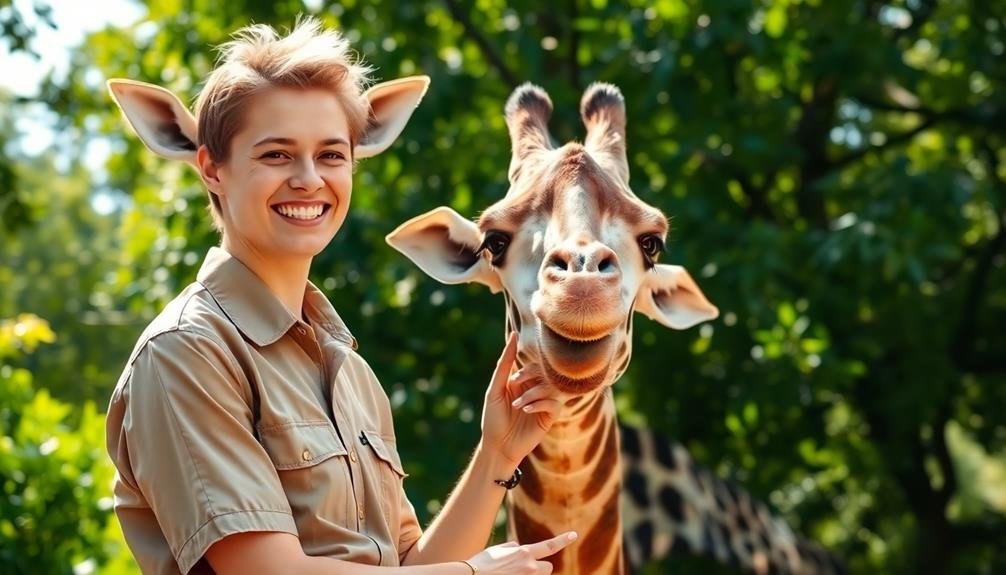
Zoos' animal feeding and care programs offer valuable opportunities for volunteers struggling with anxiety. You'll find that these roles provide a structured environment where you can focus on tasks that promote mindfulness and reduce stress.
As you prepare meals for various animals, you'll engage in repetitive, soothing activities like chopping fruits and vegetables or measuring out portions of feed. These actions can help ground you in the present moment, distracting your mind from anxious thoughts.
When you're involved in feeding animals, you'll often work alongside experienced keepers who can guide you through the process. This support system can help ease social anxiety as you collaborate on shared goals.
You may also assist with habitat maintenance, such as cleaning enclosures or replenishing water sources. These physical tasks can release endorphins, boosting your mood and reducing anxiety symptoms.
Interacting with animals, even indirectly, can have a calming effect. As you observe their behaviors and routines, you may find yourself becoming more attuned to the natural world, which can provide a sense of perspective and peace.
Regular volunteering in animal care roles can help establish a comforting routine, giving structure to your week and a sense of purpose that counters anxiety.
Visitor Education and Guidance
While working with animals directly can be therapeutic, engaging in visitor education and guidance roles at the zoo offers unique benefits for managing anxiety. You'll have the opportunity to share your knowledge and passion for wildlife with others, which can boost your confidence and sense of purpose. These roles often involve leading tours, answering questions, and providing information at exhibit stations.
Interacting with visitors can help you focus on the present moment, reducing anxious thoughts about the past or future. You'll also develop valuable communication skills and learn to adapt to different situations, which can translate to improved social interactions in your daily life.
Here's a breakdown of common visitor education roles and their anxiety-managing benefits:
| Role | Interaction Level | Anxiety Management Benefit |
|---|---|---|
| Tour Guide | High | Builds confidence, improves public speaking |
| Information Desk | Medium | Enhances problem-solving skills, reduces social anxiety |
| Exhibit Interpreter | Low to Medium | Increases knowledge, provides sense of accomplishment |
Habitat Maintenance and Cleaning
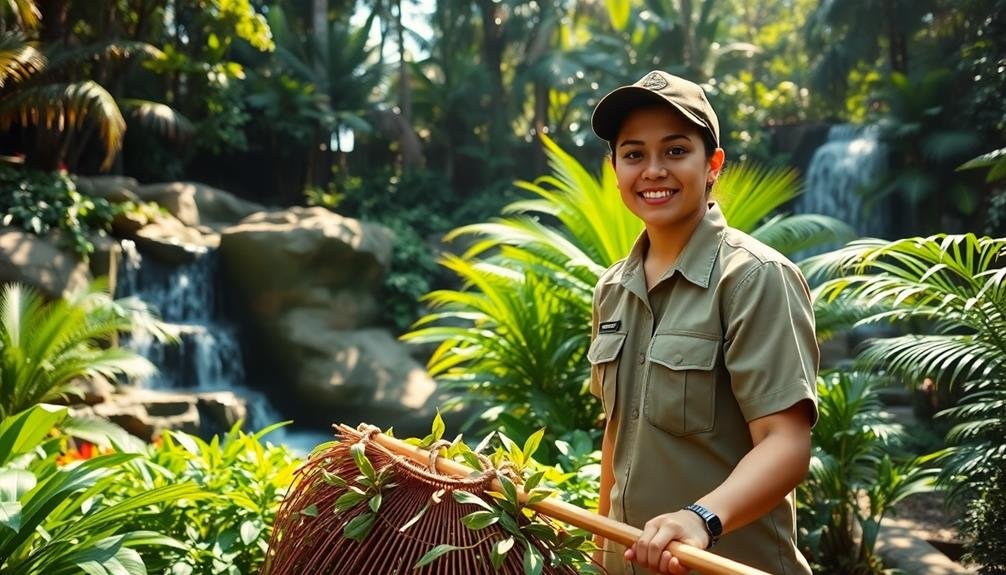
Habitat maintenance and cleaning roles offer a hands-on approach to managing anxiety through physical activity and routine. You'll find yourself engaged in tasks like sweeping pathways, raking leaves, or scrubbing enclosures. These repetitive actions can be meditative, helping you focus on the present moment and quiet racing thoughts.
As you work to keep animal habitats clean and well-maintained, you'll develop a sense of accomplishment and purpose. You're directly contributing to the animals' well-being, which can boost your self-esteem and reduce feelings of helplessness often associated with anxiety.
The physical nature of these tasks also promotes the release of endorphins, natural mood-boosters that can help alleviate anxiety symptoms. You'll likely find that the combination of fresh air, exercise, and connection with nature has a calming effect on your mind and body.
Moreover, habitat maintenance roles often allow for solitary work or small group interactions, which can be less overwhelming for those who find social situations anxiety-inducing. You'll have the opportunity to work at your own pace and gradually build confidence in a supportive environment.
Wildlife Conservation Projects
Volunteering for wildlife conservation projects at zoos offers a powerful way to channel anxiety into meaningful action. You'll be part of initiatives that directly impact endangered species and their habitats. These projects often involve data collection, habitat restoration, and public education. By focusing on these tasks, you'll shift your attention away from anxious thoughts and towards tangible conservation goals.
Many zoos collaborate with international organizations on global conservation efforts. You might find yourself contributing to breeding programs, assisting with research studies, or participating in community outreach. These roles provide a sense of purpose and connection to the larger world, which can be especially beneficial if anxiety makes you feel isolated.
Here are some specific wildlife conservation projects you might encounter:
- Monitoring and recording animal behaviors for research
- Assisting with habitat enrichment programs
- Participating in species reintroduction programs
- Helping with wildlife population surveys
- Supporting zoo-based education programs on conservation
Animal Enrichment Activities
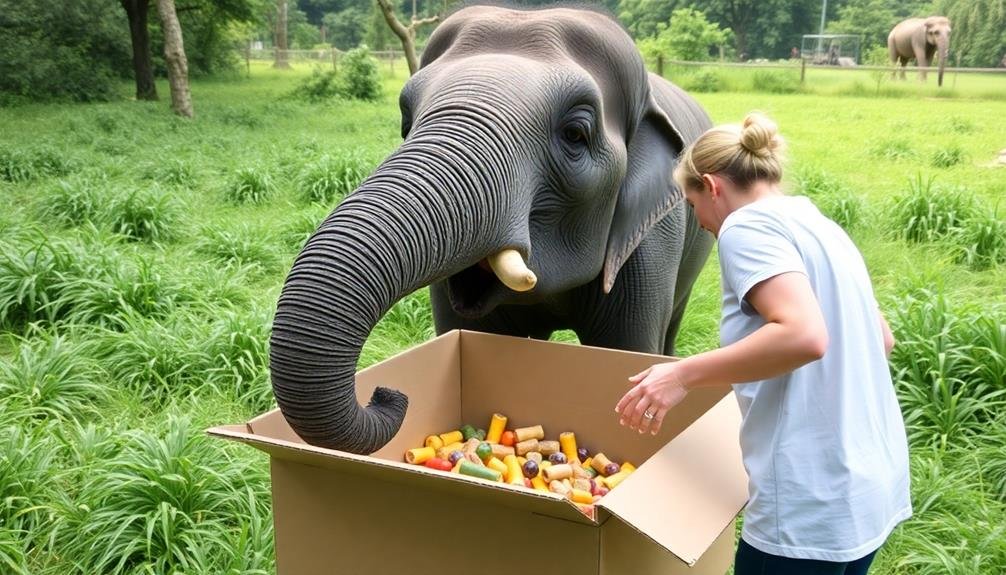
Engaging in animal enrichment activities can be a deeply rewarding experience for zoo volunteers struggling with anxiety. These tasks involve creating stimulating environments and experiences for the animals, which can help distract you from your own worries.
You'll often work on designing and constructing puzzle feeders, scent trails, or novel toys that encourage natural behaviors in the animals. As you focus on crafting these enrichment items, you'll find your mind occupied with problem-solving and creativity, rather than anxious thoughts.
You might prepare frozen treats for primates or big cats, hiding their favorite foods inside ice blocks or papier-mâché containers. This hands-on work can be grounding and meditative.
Observing the animals interact with your enrichment creations can bring a sense of accomplishment and joy. You'll see firsthand how your efforts improve the animals' well-being, which can boost your own mood and self-esteem.
The repetitive nature of some tasks, like weaving rope toys or stuffing kong toys, can also have a calming effect. By immersing yourself in these activities, you're not only helping the animals but also managing your anxiety through purposeful, engaging work.
Administrative Support Roles
A quieter environment awaits those who prefer less hands-on animal interaction. Administrative support roles at zoos offer a structured setting that can be beneficial for managing anxiety.
You'll find yourself working behind the scenes, contributing to the zoo's operations in essential ways. These positions often involve data entry, filing, and organizing paperwork, which can provide a sense of control and accomplishment.
You might assist with:
- Updating animal records and databases
- Preparing educational materials for visitors
- Managing volunteer schedules and coordination
- Processing donations and membership applications
- Organizing and maintaining the zoo's library resources
These tasks allow you to focus on specific goals, which can help reduce anxious thoughts.
You'll develop valuable skills while supporting the zoo's mission. The predictable nature of administrative work can create a comforting routine, giving you a sense of stability.
You'll also have the opportunity to interact with staff and other volunteers in a controlled setting, potentially easing social anxiety.
Gardening and Landscaping
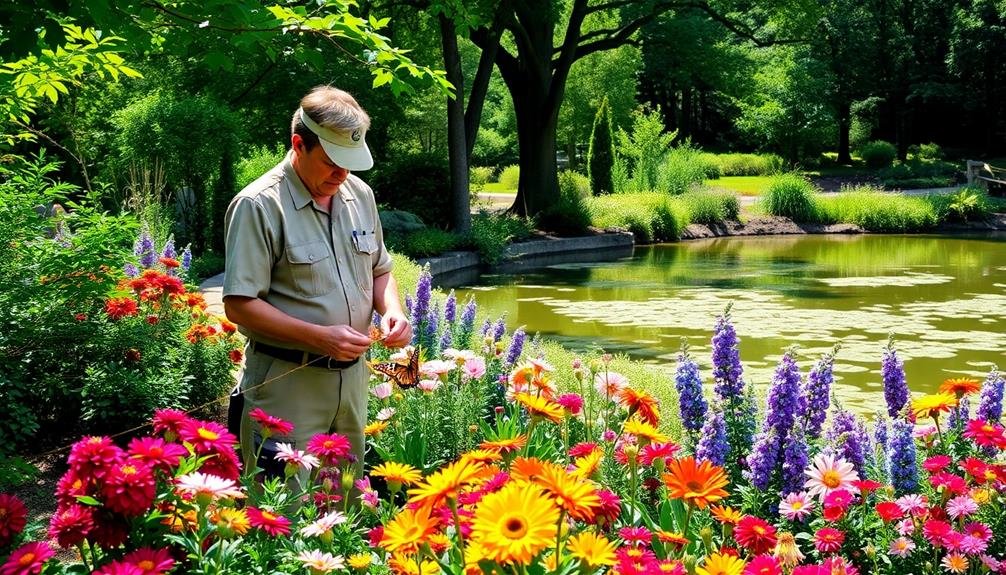
For those who prefer a more hands-on outdoor experience, zoo gardening and landscaping roles offer a perfect blend of nature and tranquility. You'll find yourself tending to various plants, flowers, and green spaces throughout the zoo, creating a welcoming environment for both animals and visitors.
As you work with your hands in the soil, you'll feel a deep connection to nature that can help calm your anxious thoughts. The repetitive tasks of planting, weeding, and pruning provide a meditative experience, allowing your mind to focus on the present moment.
Here's a glimpse of what you might encounter in your zoo gardening role:
| Task | Benefit |
|---|---|
| Planting flowers | Boosts creativity |
| Pruning shrubs | Improves focus |
| Watering plants | Promotes relaxation |
| Mulching beds | Enhances mindfulness |
| Designing landscapes | Builds confidence |
These activities not only contribute to the zoo's beauty but also offer therapeutic benefits. You'll work at your own pace, often in quiet areas away from crowds, which can be particularly soothing for those with social anxiety. The sense of accomplishment you'll feel as you watch your efforts bloom and grow can greatly boost your self-esteem and overall well-being.
Special Events Assistance
You'll find exciting opportunities in special events assistance at the zoo, where you can contribute to behind-the-scenes event support.
You'll help with tasks like setting up exhibits, preparing animal demonstrations, and coordinating with staff to guarantee smooth operations.
Learning crowd management techniques will be a valuable skill, as you'll assist in guiding visitors and maintaining a calm atmosphere during busy events.
Behind-The-Scenes Event Support
Behind-the-scenes event support offers a unique opportunity for volunteers to manage anxiety while contributing to special zoo occasions. You'll work in a less public-facing role, helping with event preparation and coordination. This position allows you to be involved in exciting zoo activities without the pressure of direct guest interaction.
As a behind-the-scenes volunteer, you'll assist with various tasks that are fundamental to the success of special events. These responsibilities may include:
- Setting up decorations and equipment
- Organizing materials for activities
- Preparing goodie bags or event packets
- Coordinating with vendors and staff
- Assisting with post-event cleanup
Your work will be essential in creating memorable experiences for zoo visitors. You'll have the chance to see the inner workings of event planning and execution, which can be both educational and rewarding.
The structured nature of these tasks can help reduce anxiety by providing clear objectives and a sense of accomplishment. Working behind the scenes also allows you to contribute to the zoo's mission without feeling overwhelmed by crowds.
You'll have opportunities to interact with staff and other volunteers in a more controlled environment, potentially helping you build confidence and social skills at your own pace.
Crowd Management Techniques
During special events at the zoo, effective crowd management becomes essential for maintaining a safe and enjoyable environment. As a volunteer, you'll play a significant role in ensuring visitors have a positive experience while keeping anxiety at bay.
You'll learn to guide people calmly and efficiently, helping them navigate through busy areas and directing them to less crowded spaces.
You'll be trained in de-escalation techniques to handle potentially stressful situations. This includes using a calm voice, maintaining open body language, and offering clear, concise information.
You'll also learn to identify signs of anxiety in visitors and provide assistance when needed.
Your duties may involve managing queues, answering questions, and providing directions.
You'll work closely with other volunteers and staff to coordinate efforts during peak times.
Frequently Asked Questions
Are There Age Restrictions for Zoo Volunteer Roles?
You'll find age restrictions vary by zoo. Many require volunteers to be at least 16 or 18 years old. Some offer special programs for younger teens or families. Check with your local zoo for specific age requirements.
How Many Hours per Week Are Typically Required for Volunteering?
You'll typically find that zoo volunteer roles require anywhere from 2 to 20 hours per week. It's flexible, and you can often choose your commitment level. Many zoos offer both regular and occasional volunteer opportunities to suit your schedule.
Do Zoo Volunteers Need Prior Experience or Specific Qualifications?
You don't typically need prior experience or specific qualifications to volunteer at a zoo. Many zoos provide on-the-job training. However, you'll need passion for animals, good communication skills, and a willingness to learn and follow instructions.
Can Volunteers Interact Directly With Dangerous or Exotic Animals?
You typically can't interact directly with dangerous or exotic animals as a volunteer. Zoos prioritize safety and reserve these interactions for trained professionals. Your role will likely involve less risky tasks and animals that are easier to manage.
Are There Opportunities for Career Advancement Through Zoo Volunteering?
You'll find many opportunities for career advancement through zoo volunteering. You can gain valuable experience, network with professionals, and develop relevant skills. Some volunteers move to paid positions or use their experience to pursue related careers in animal care or conservation.
In Summary
You've discovered a variety of zoo volunteer roles that can help manage anxiety. Whether you're feeding animals, educating visitors, maintaining habitats, or assisting with conservation projects, you'll find opportunities to focus on meaningful tasks and connect with nature. Don't forget about enrichment activities, administrative work, gardening, and event support. By choosing a role that suits your interests and comfort level, you're taking a positive step towards managing anxiety while contributing to wildlife care and conservation.



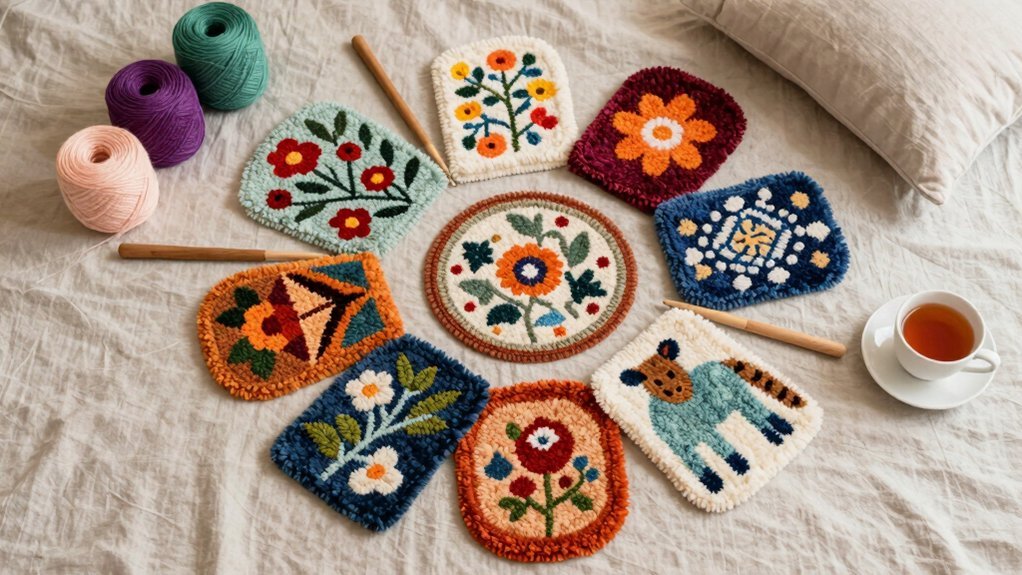

Leave a Reply